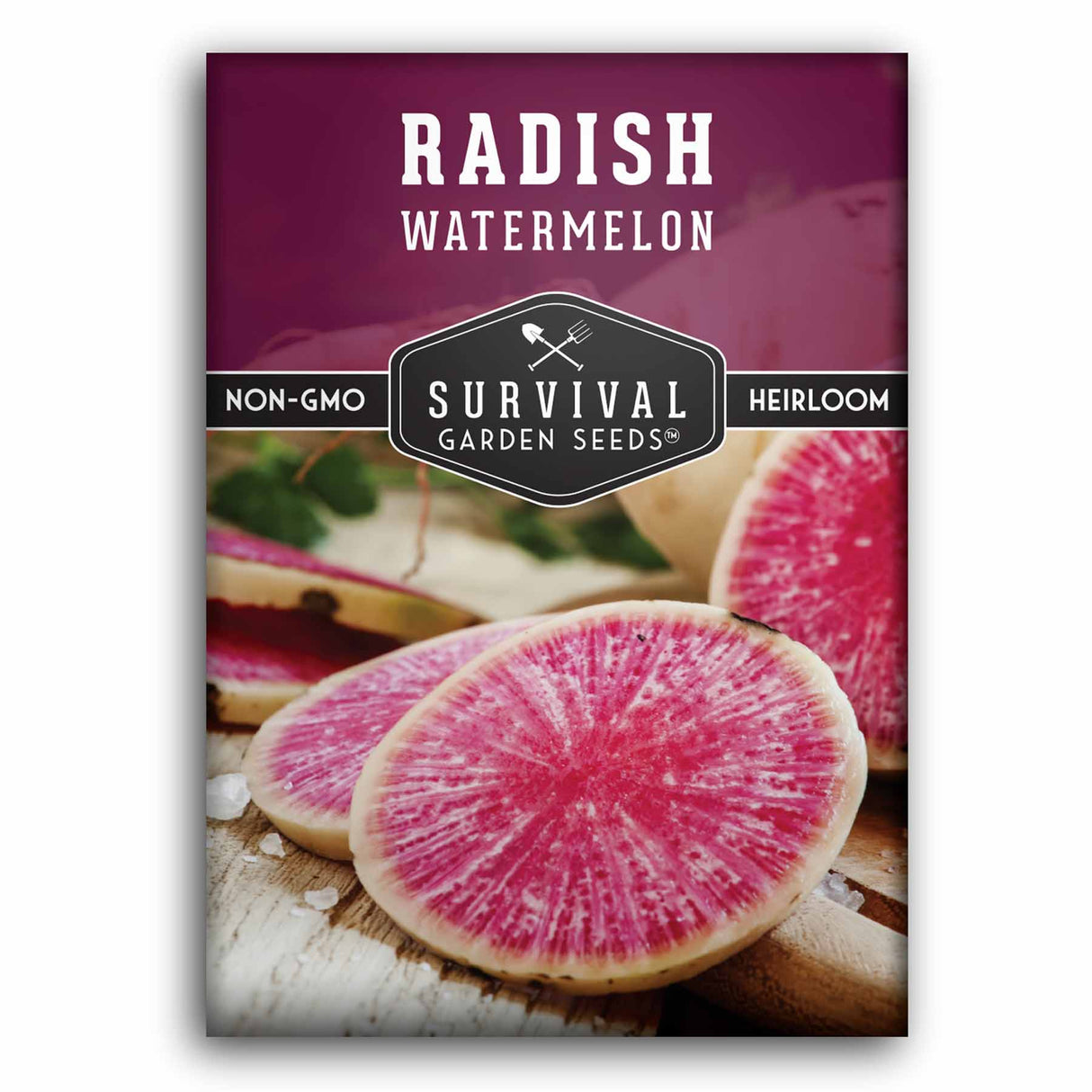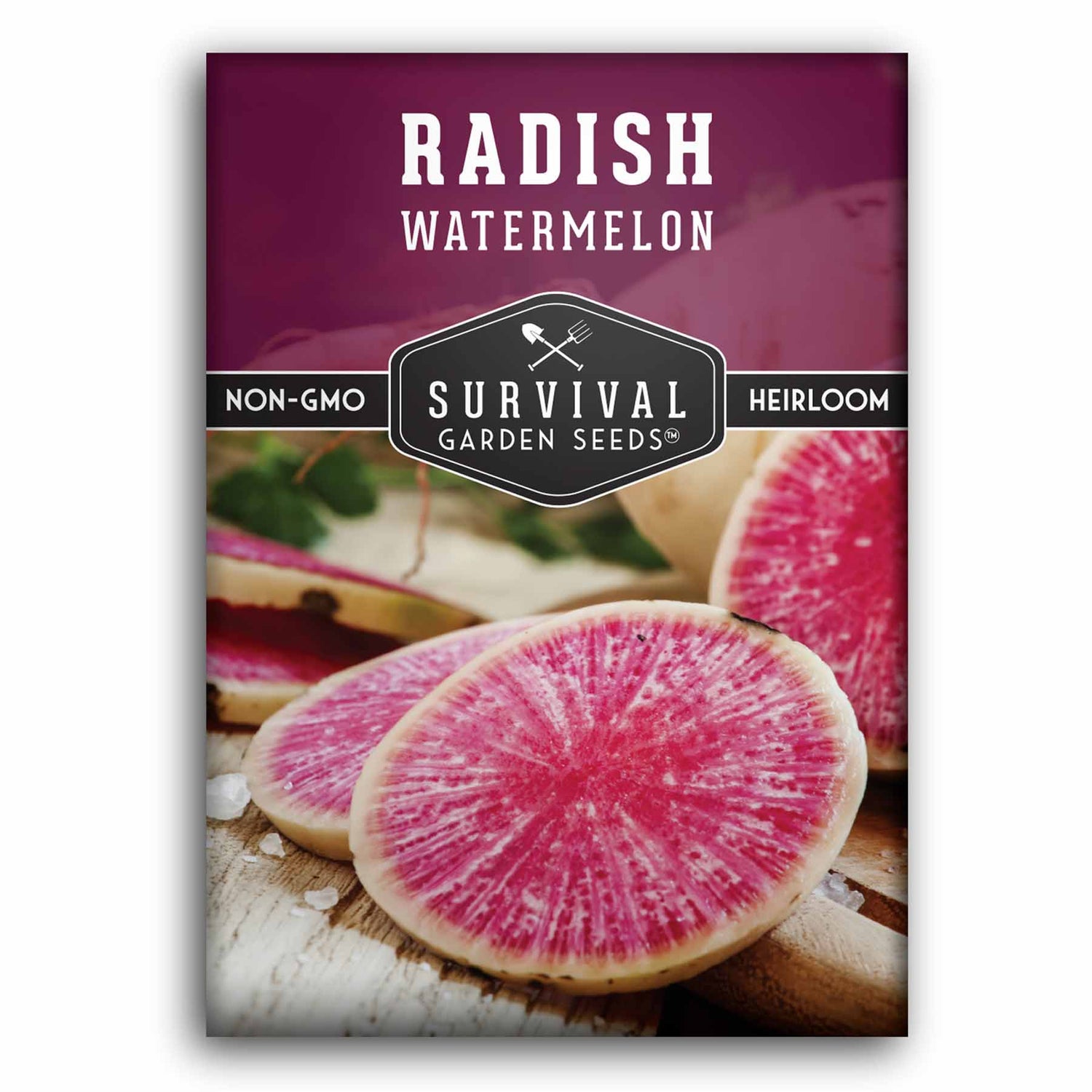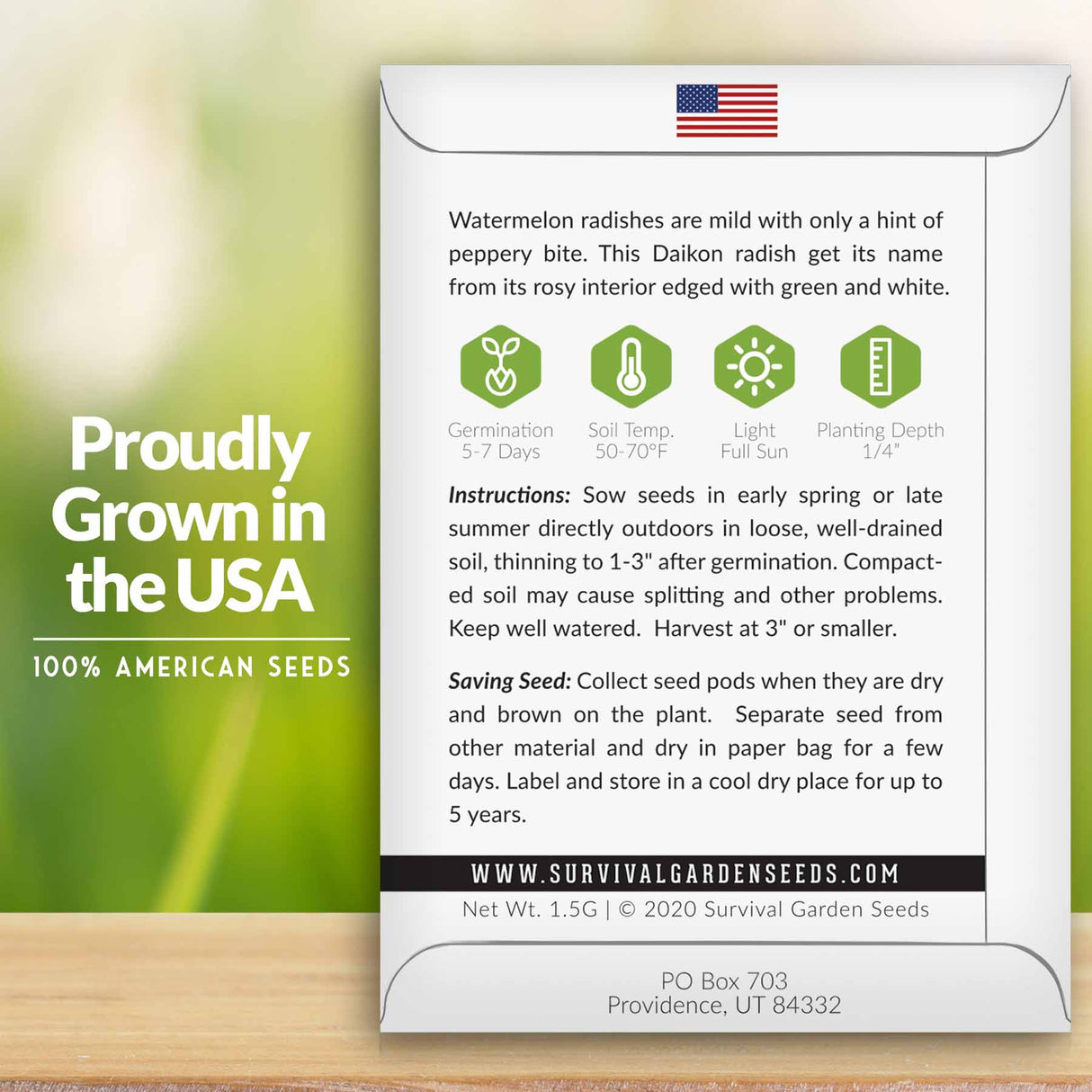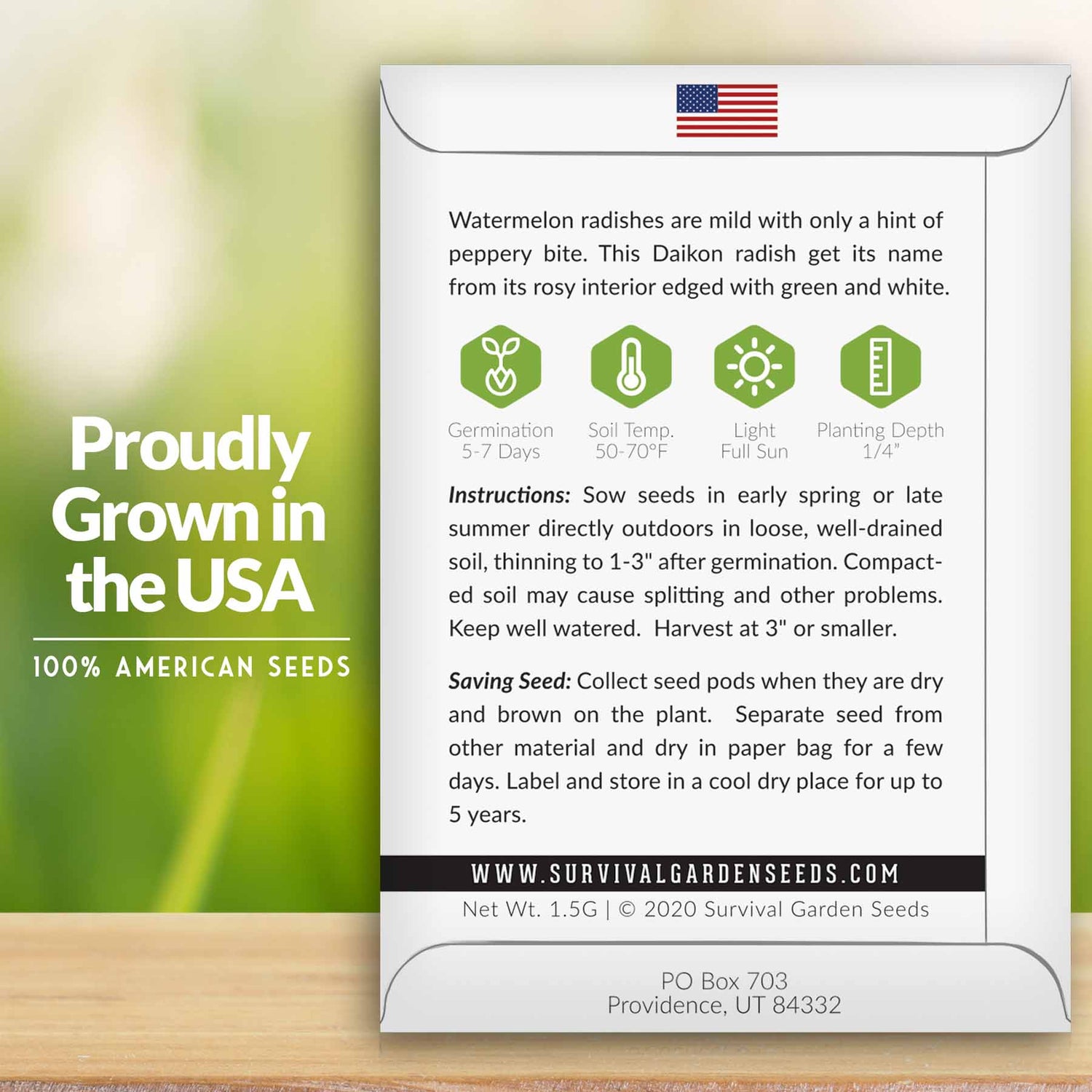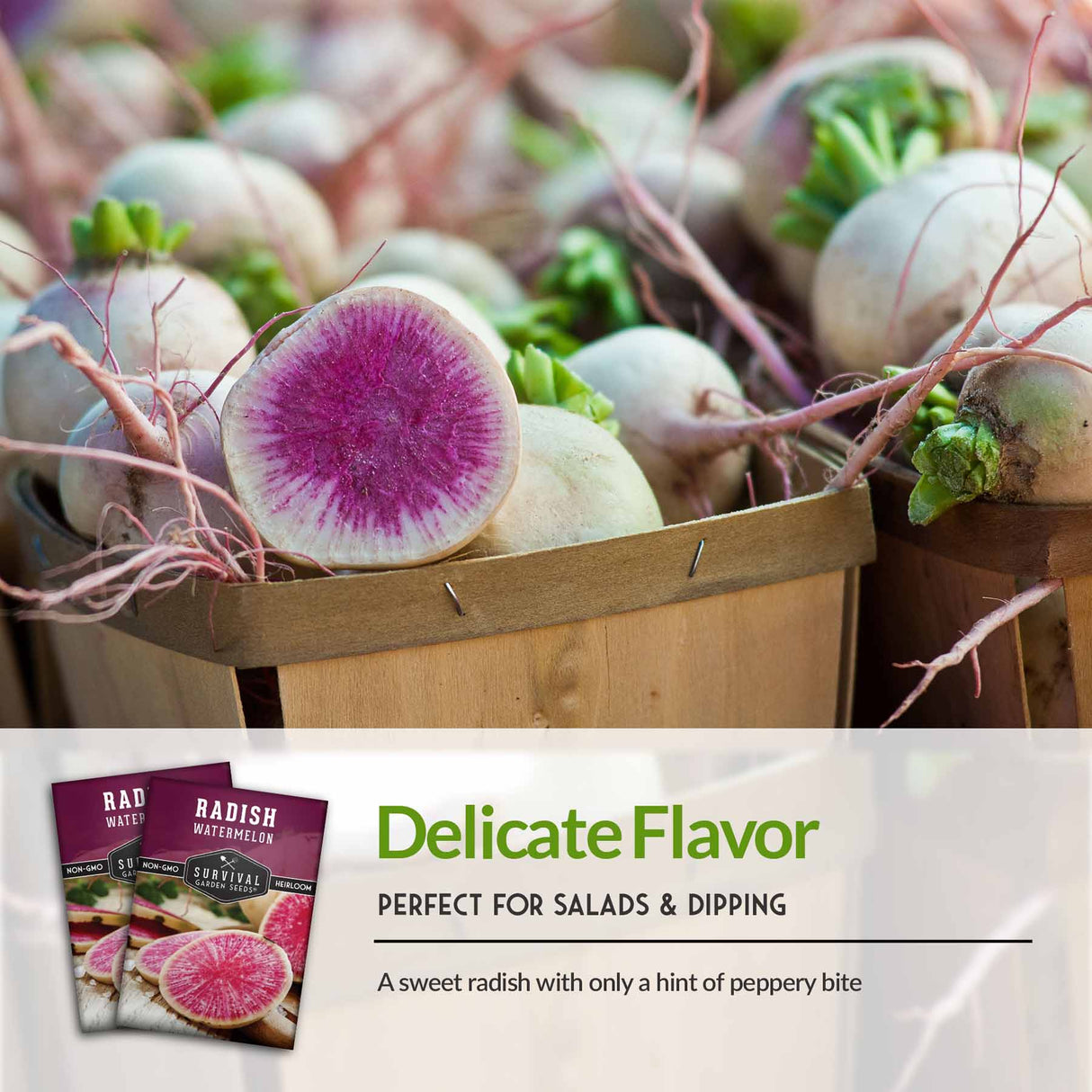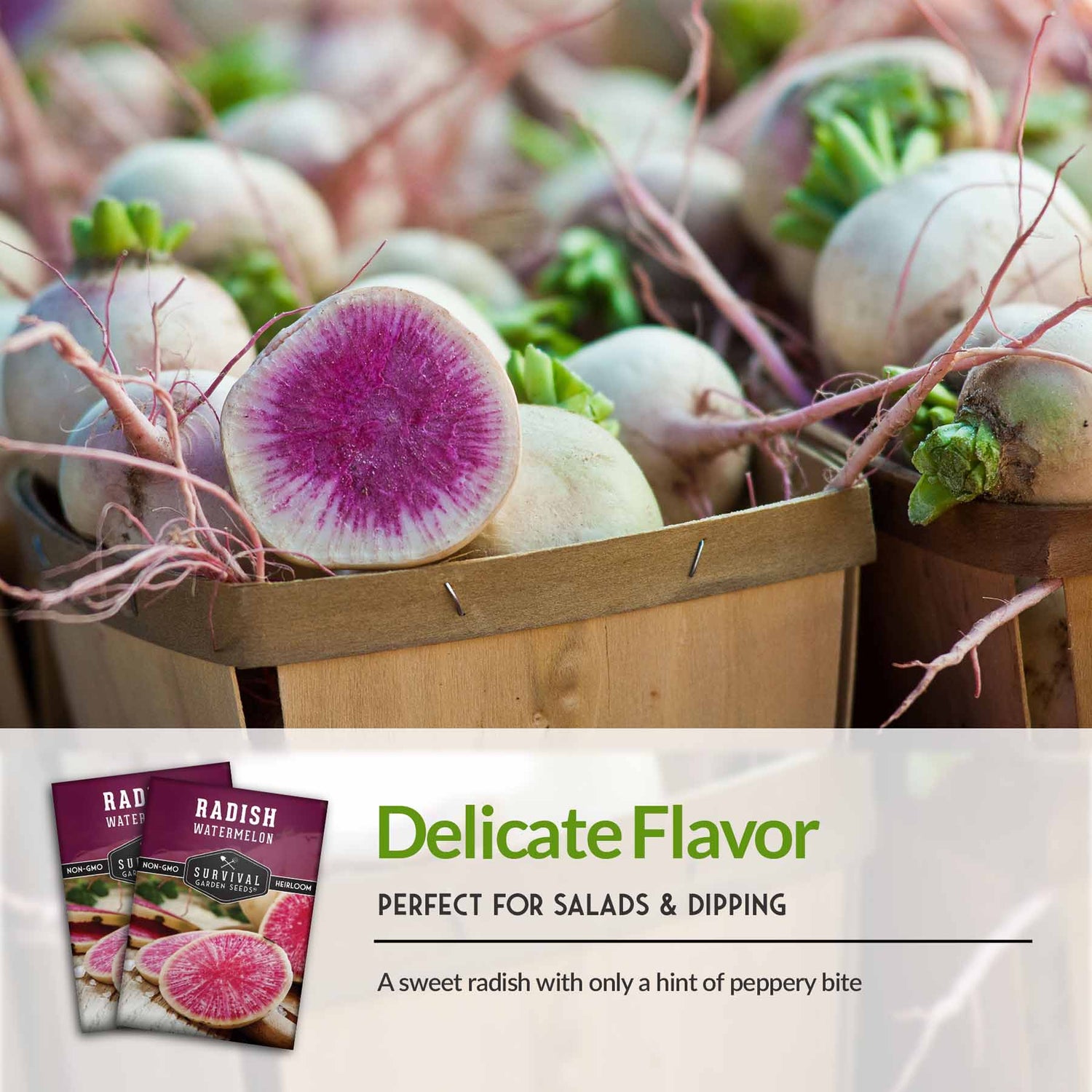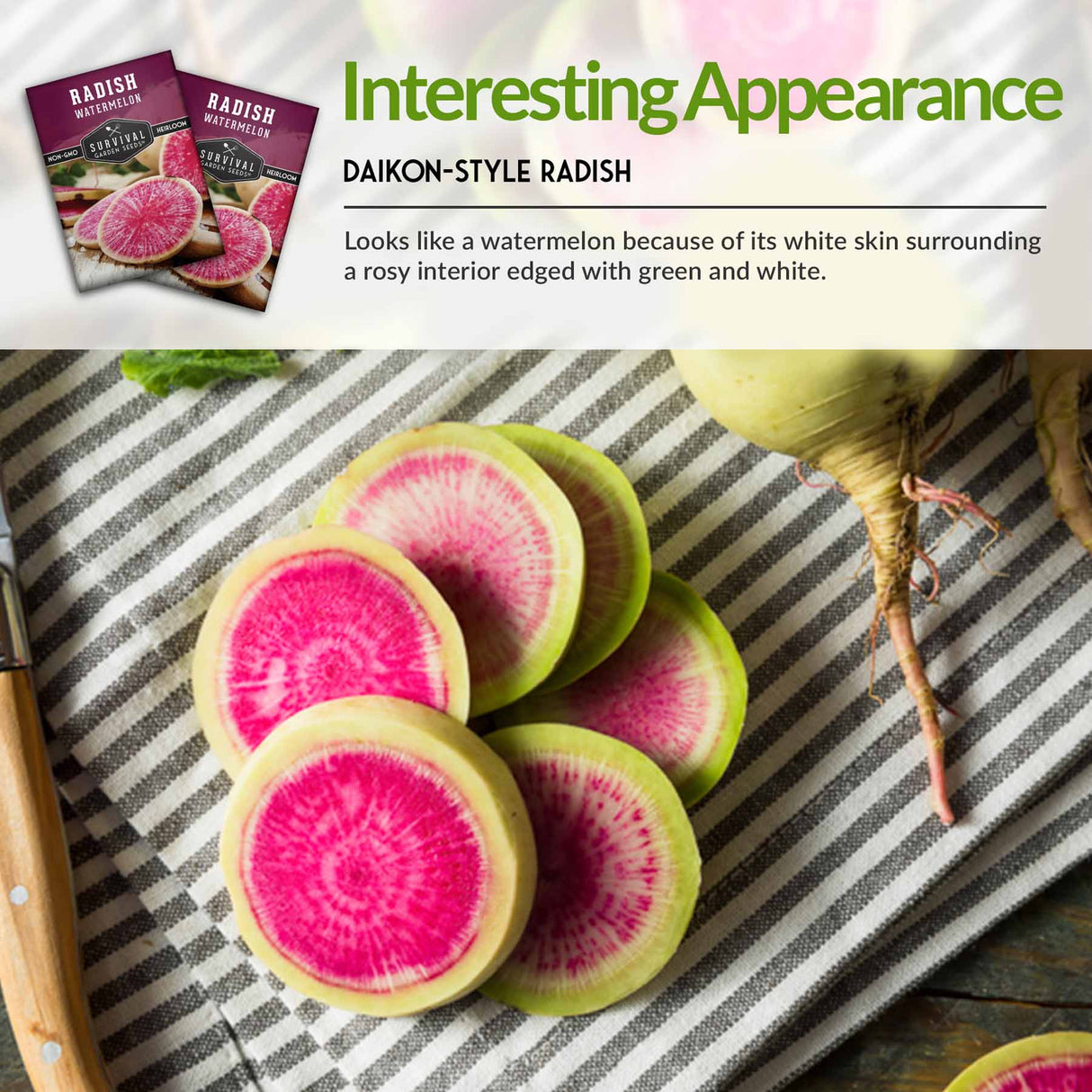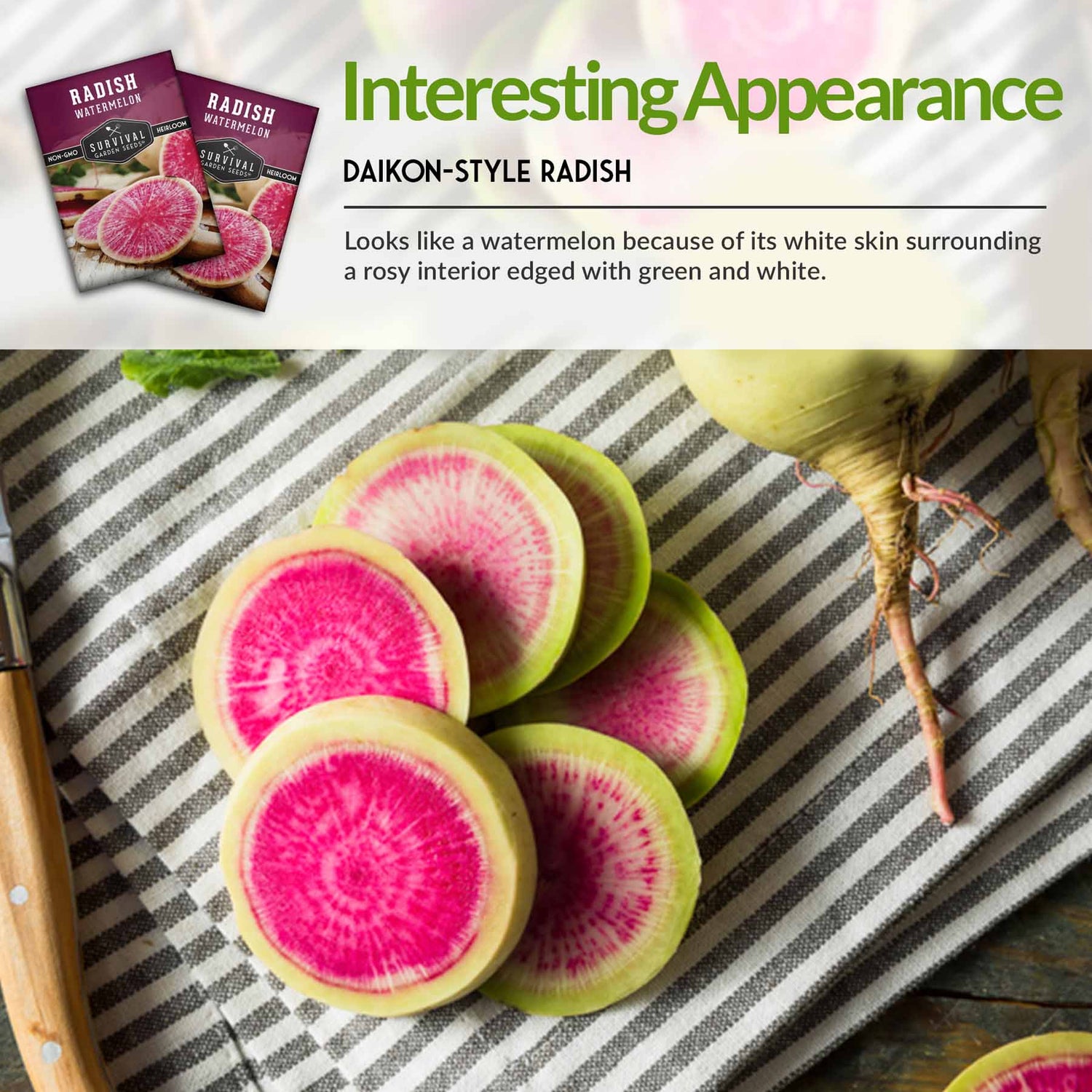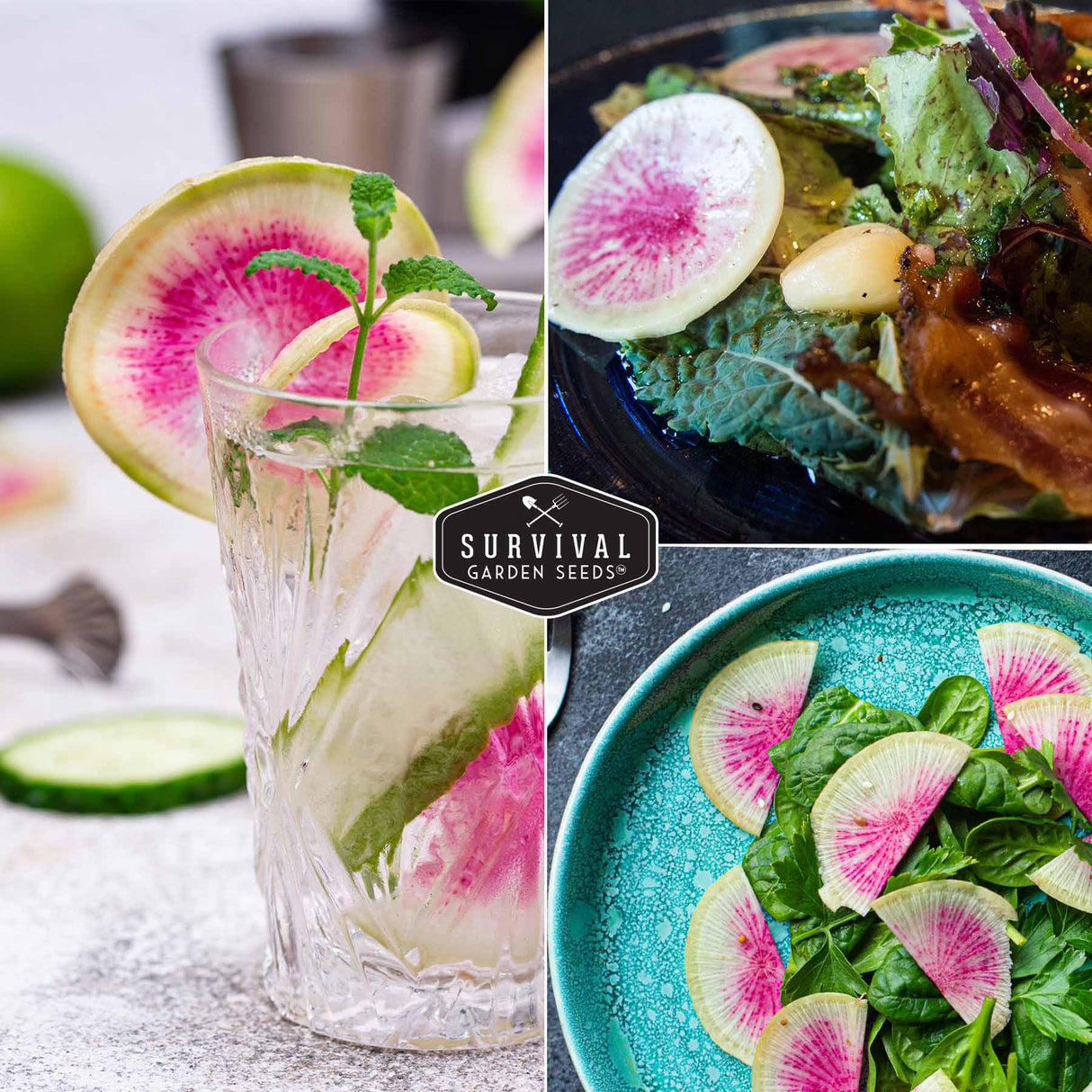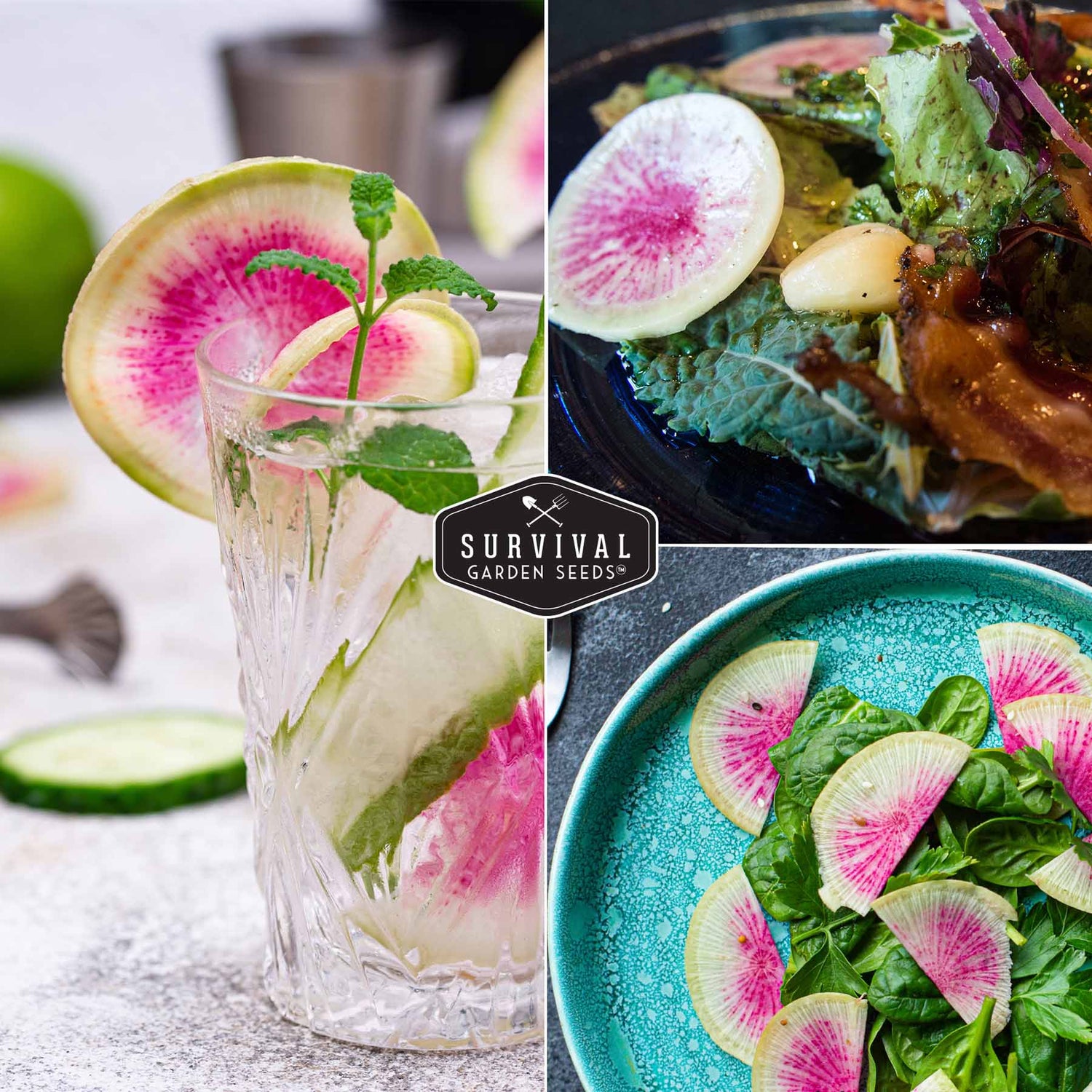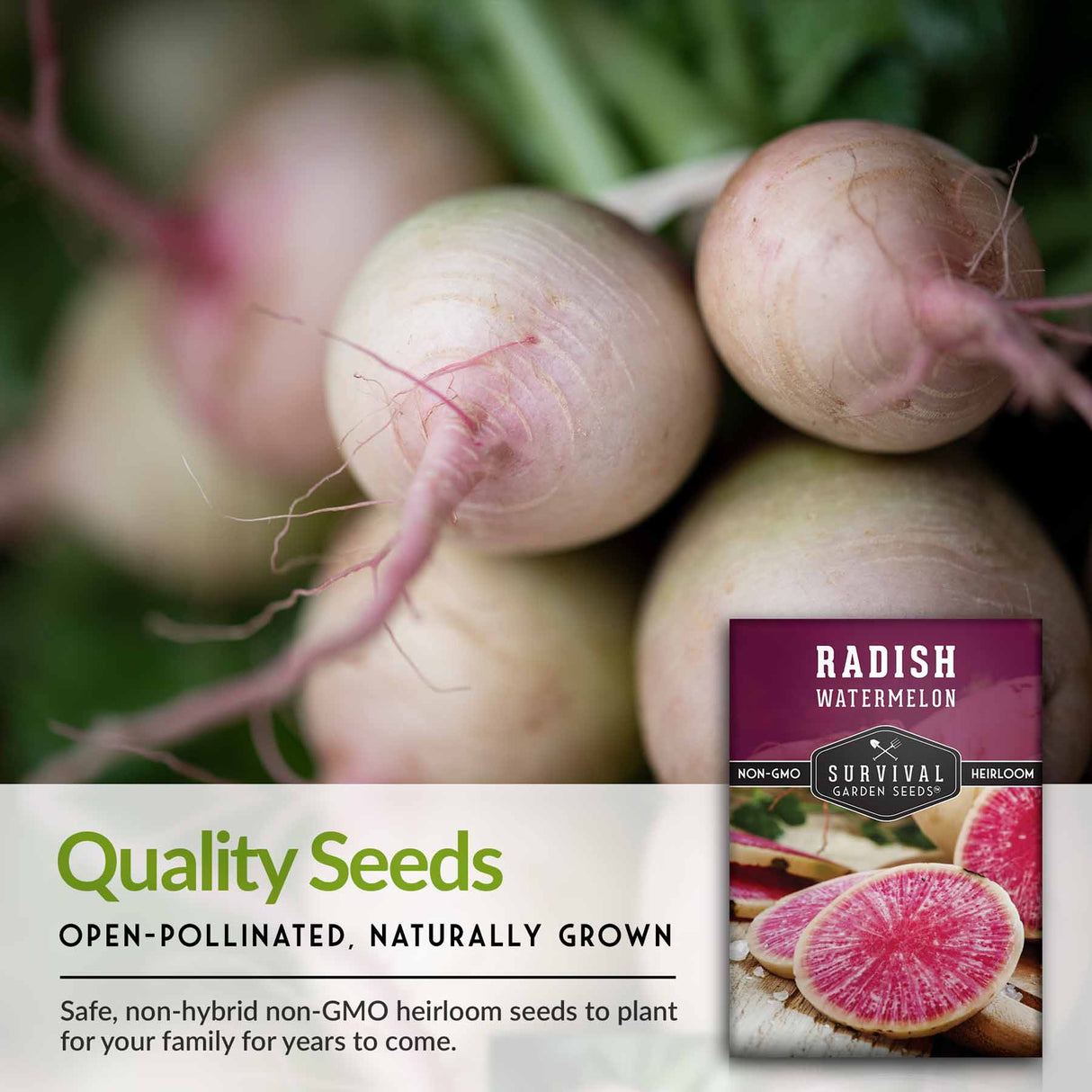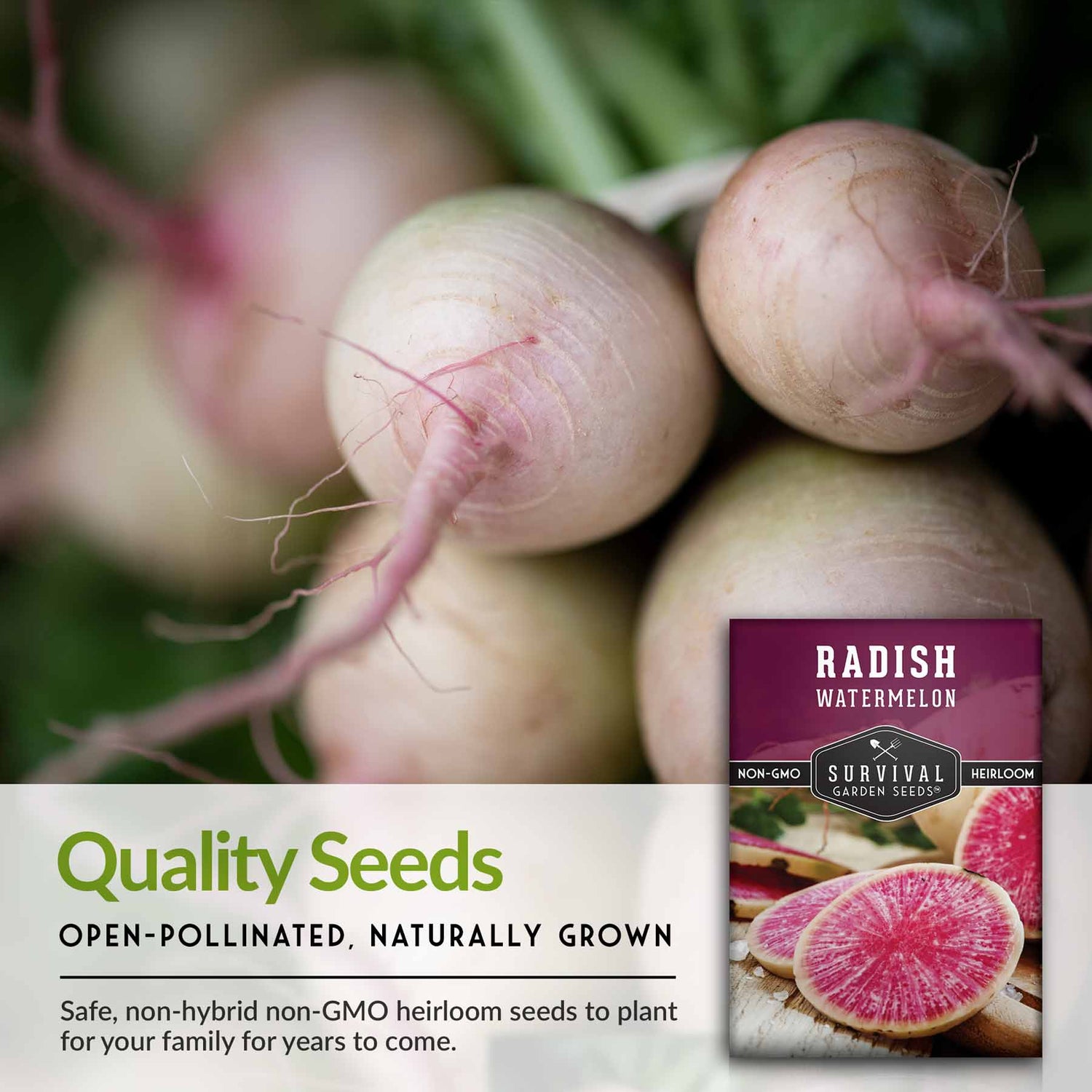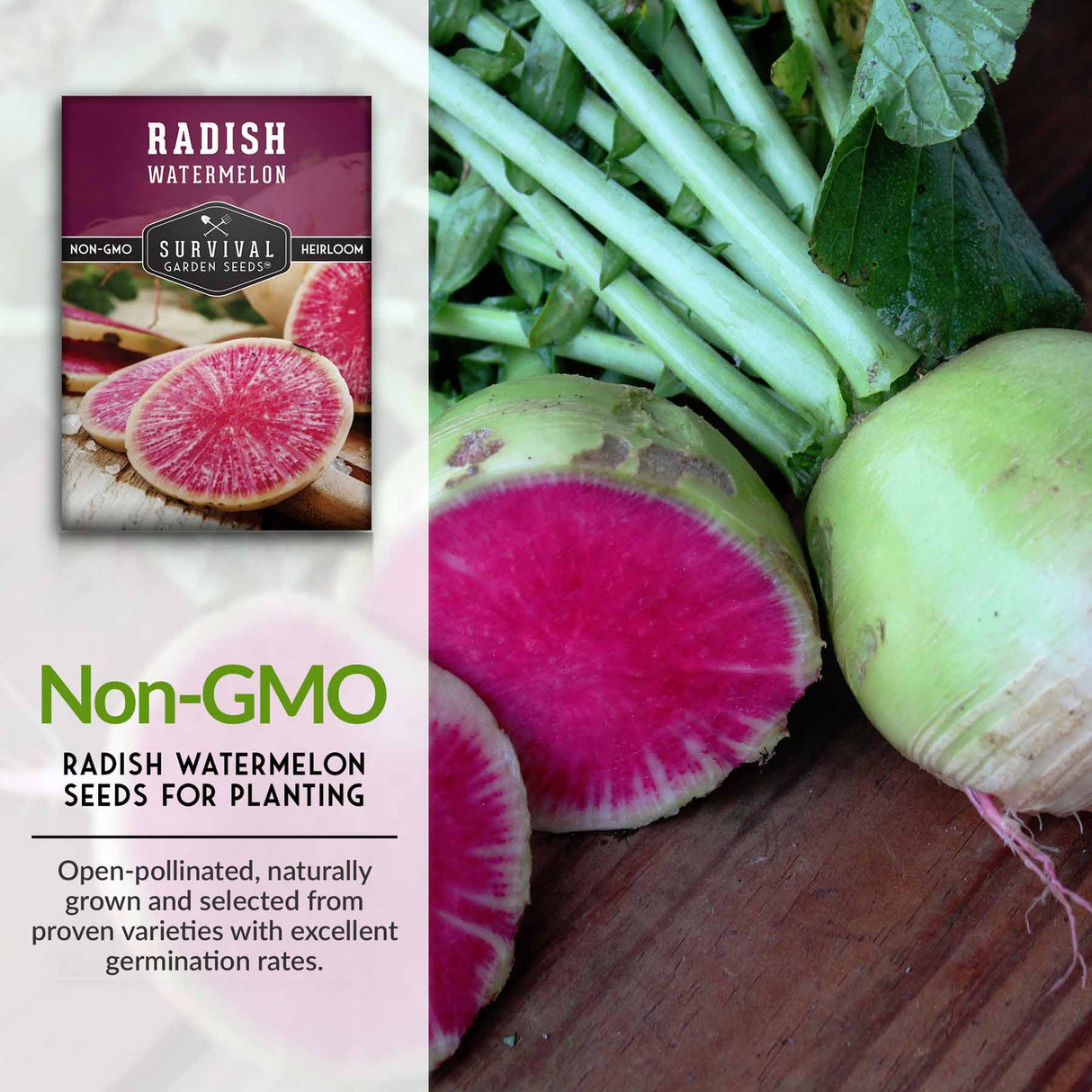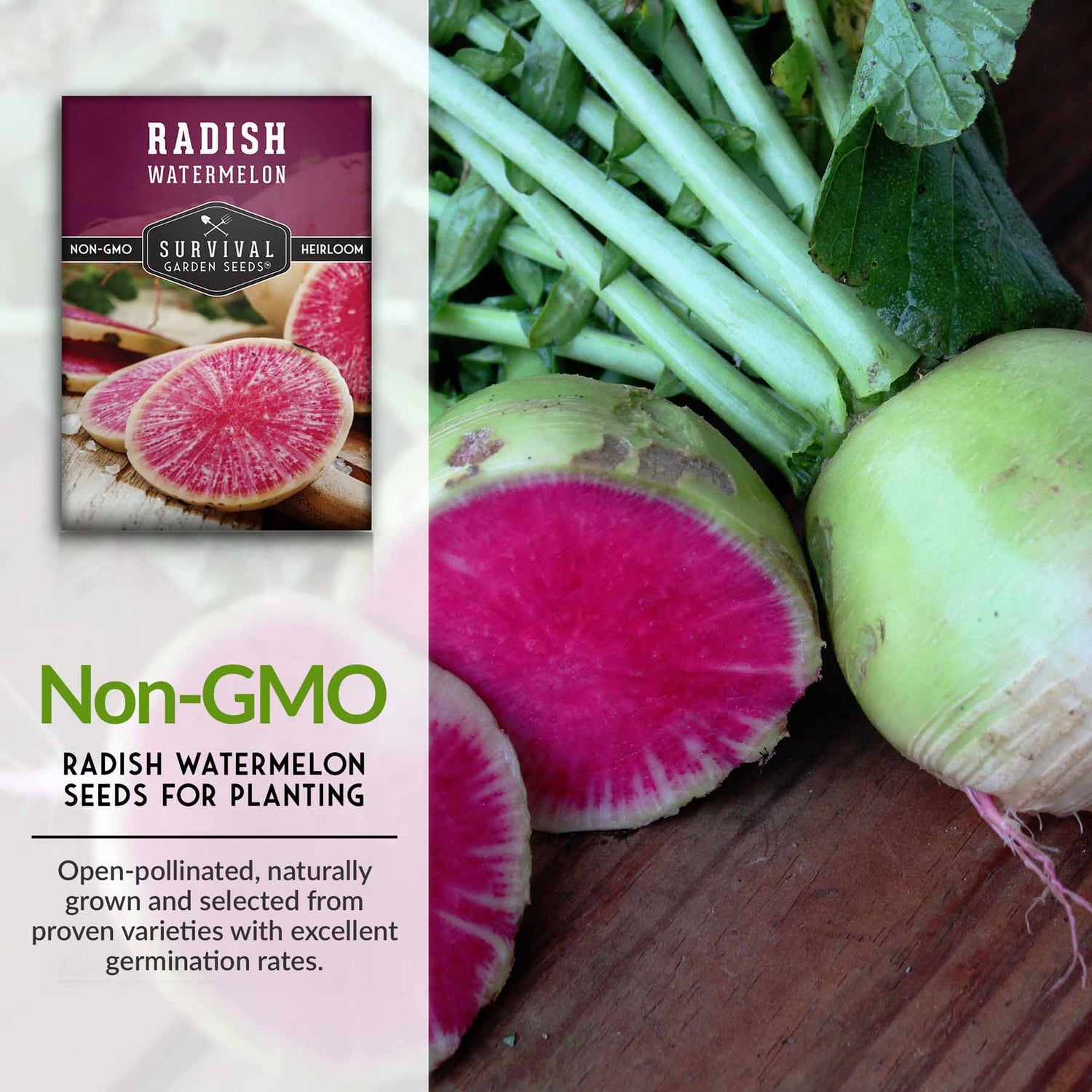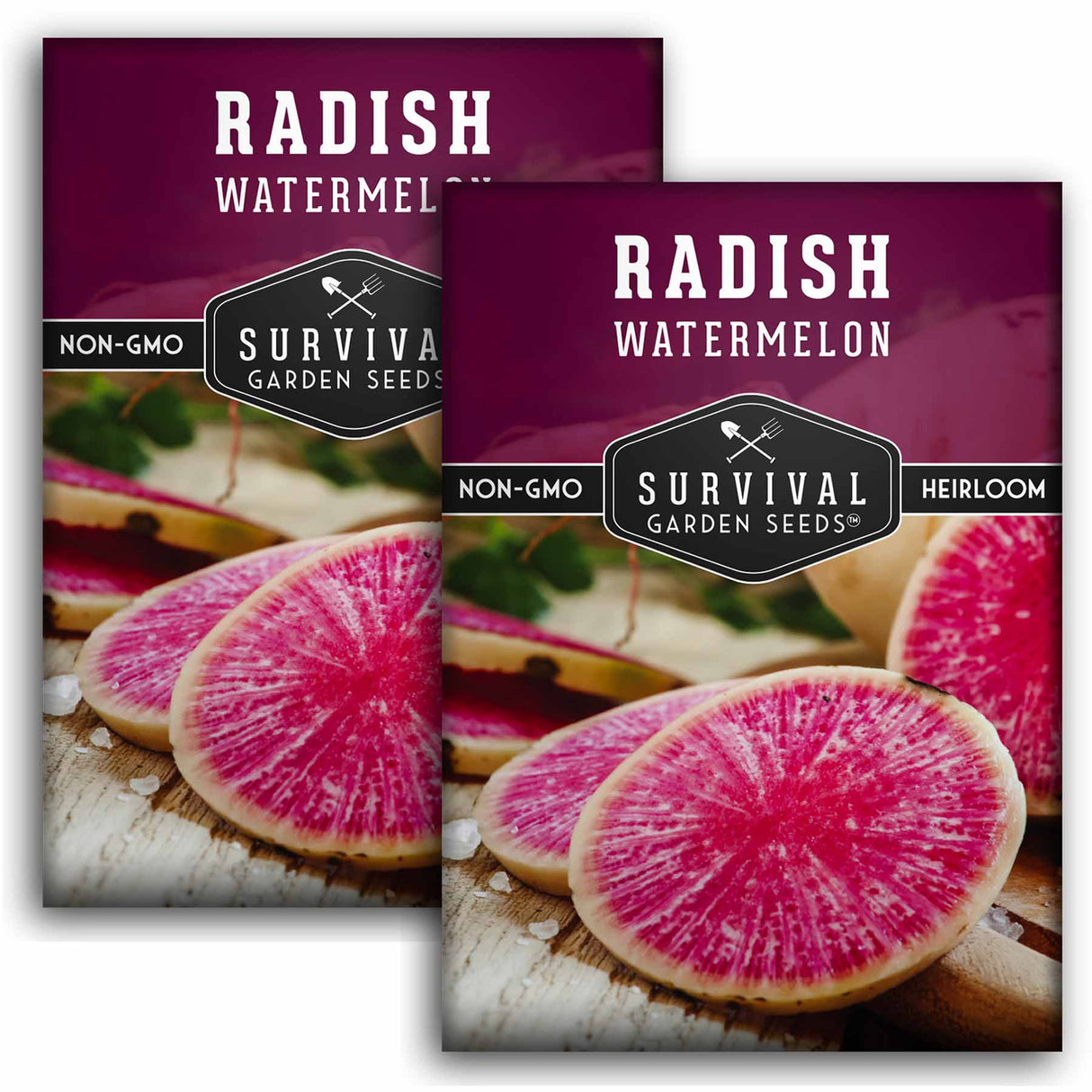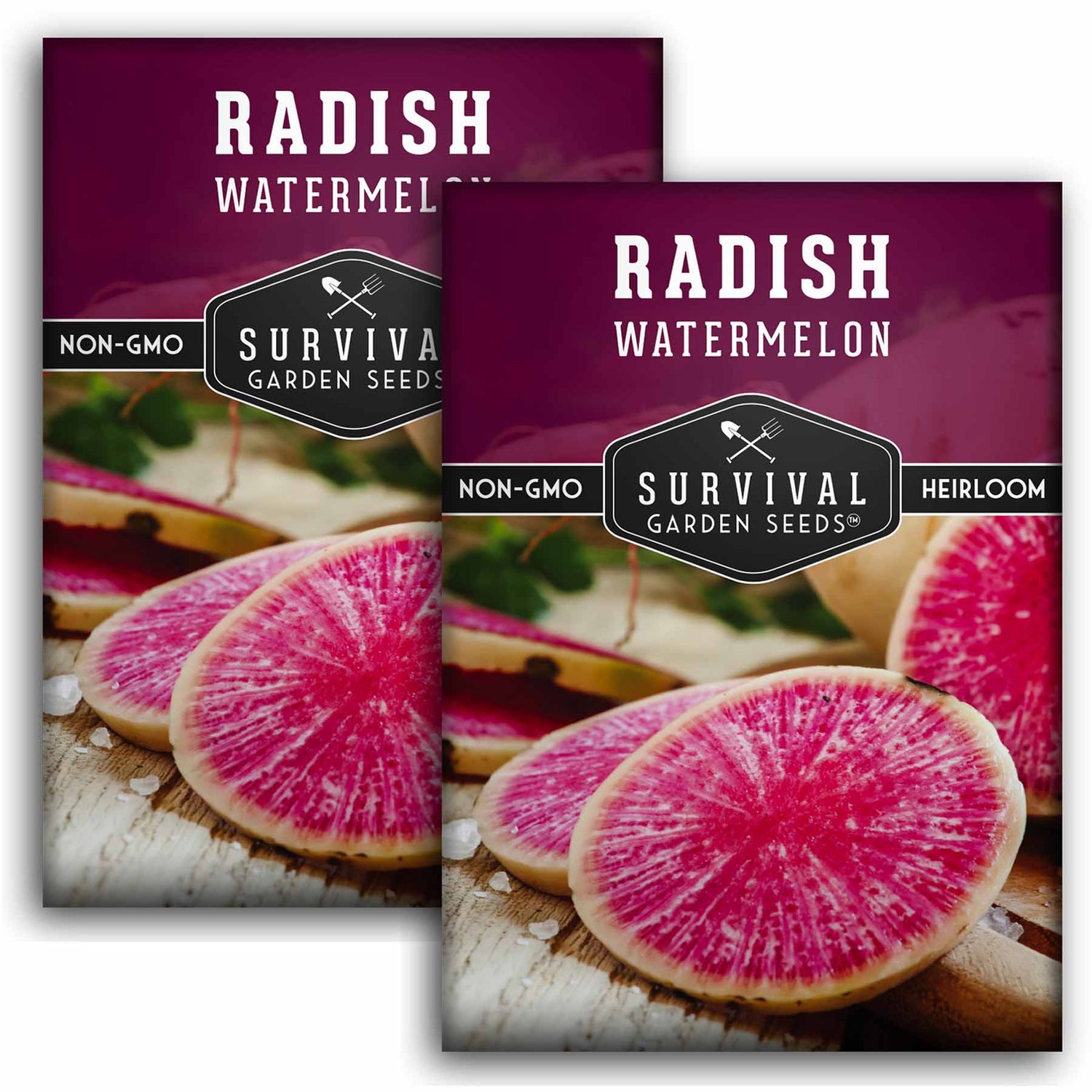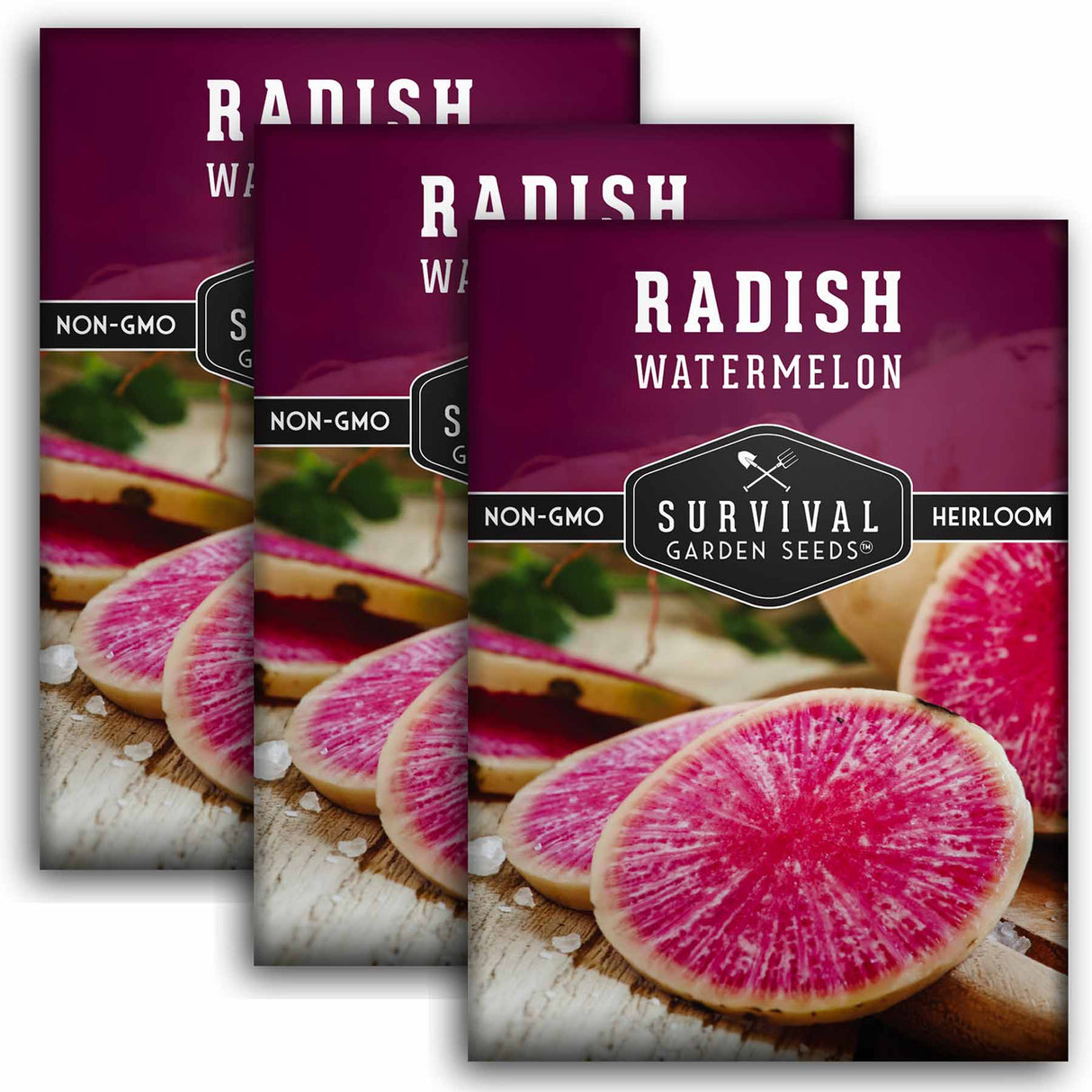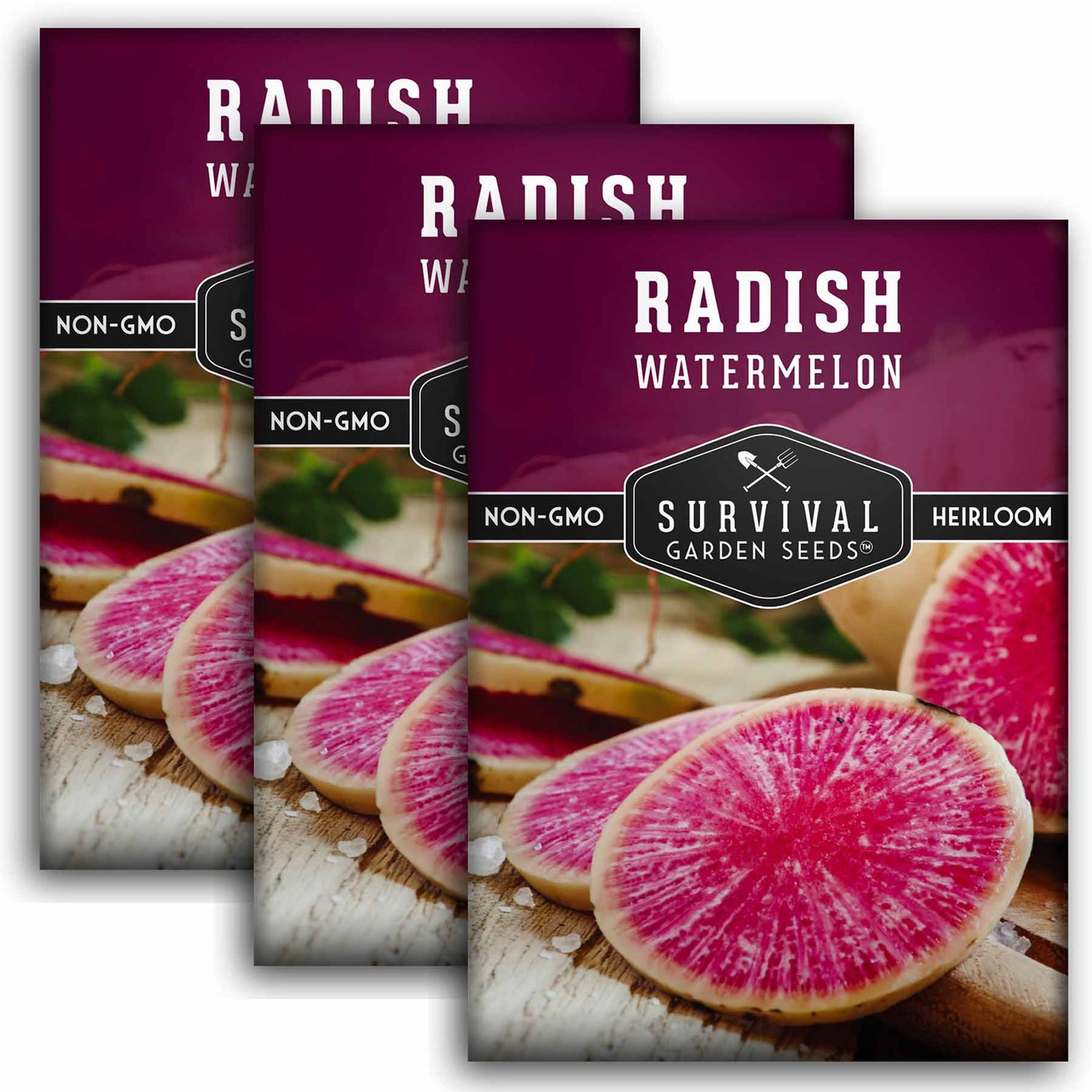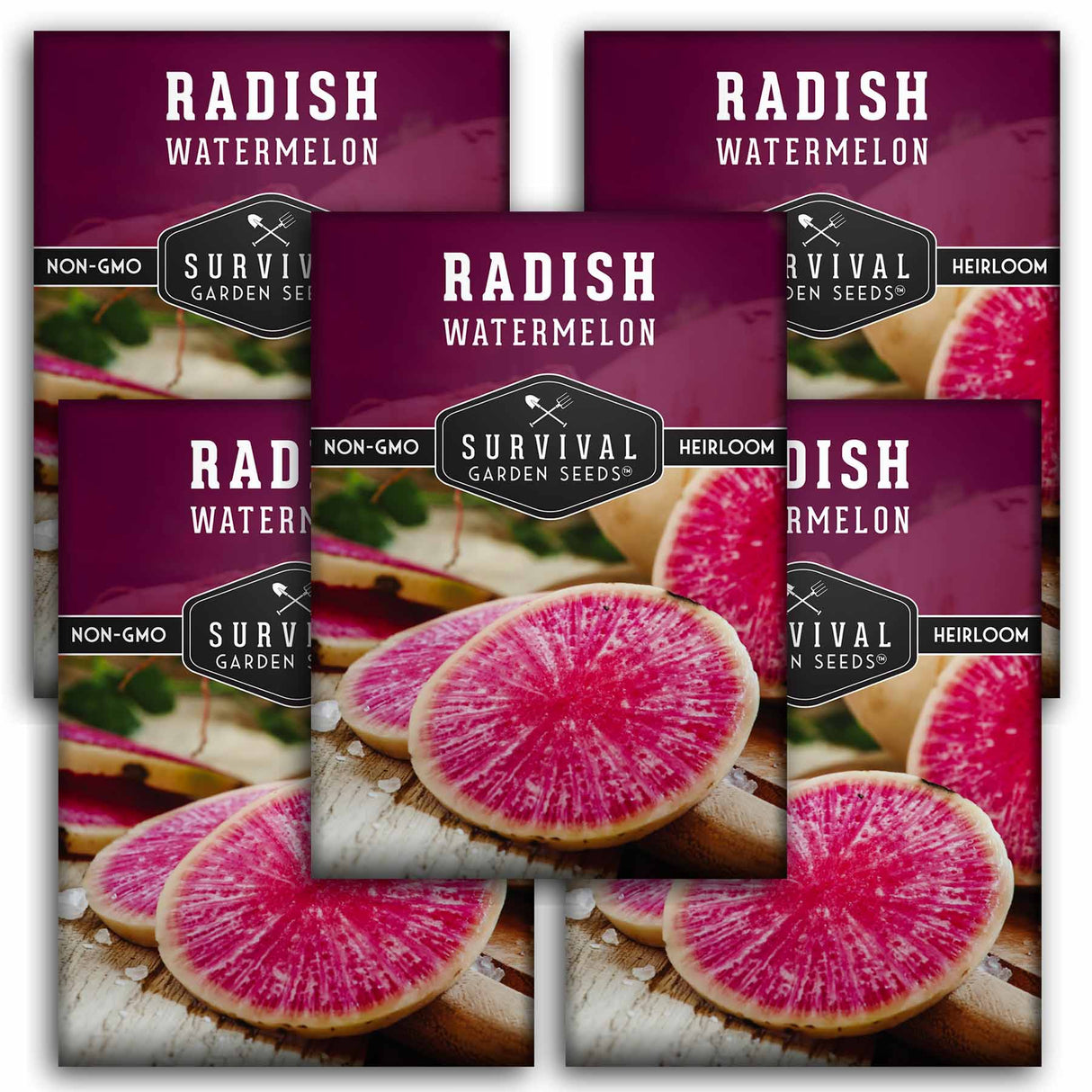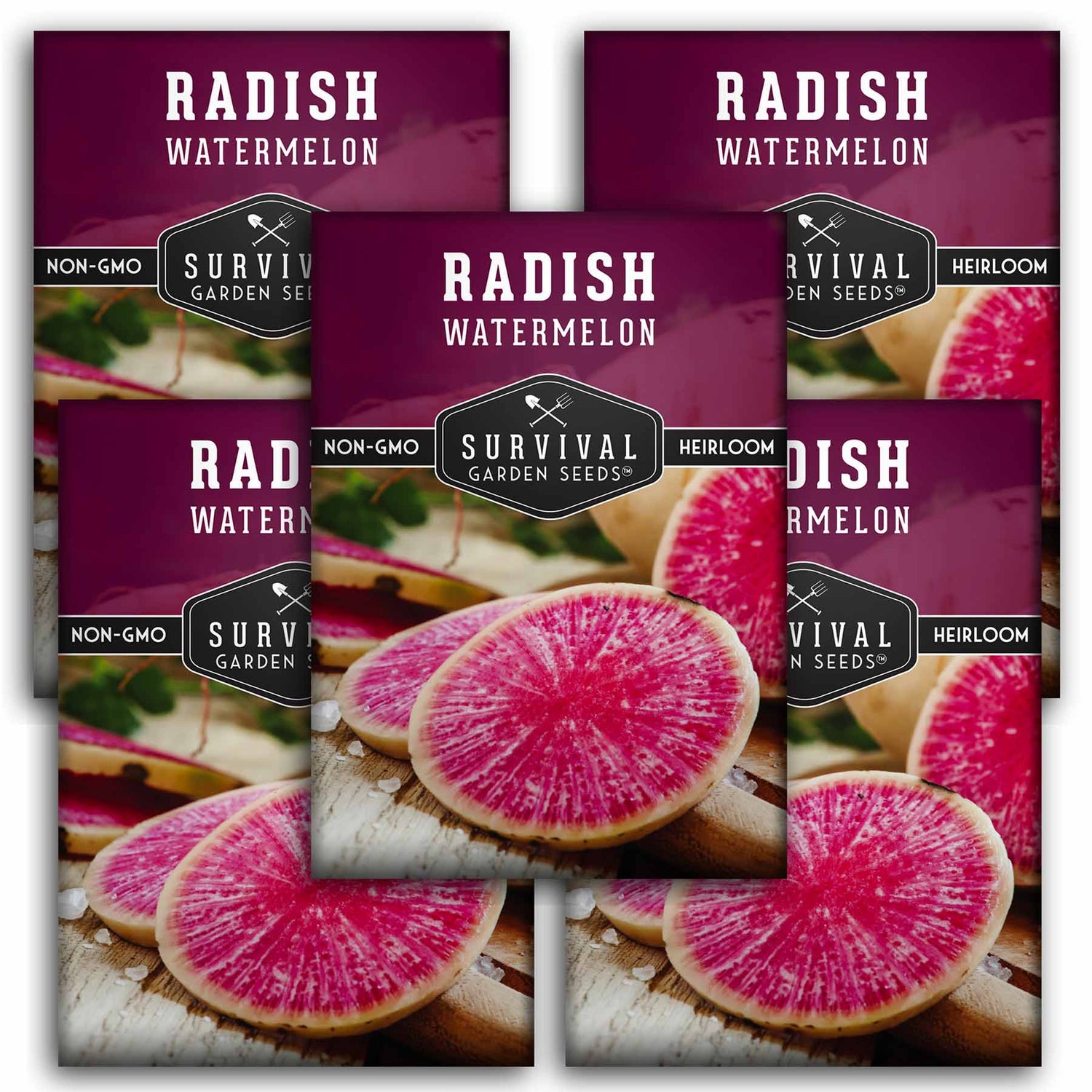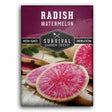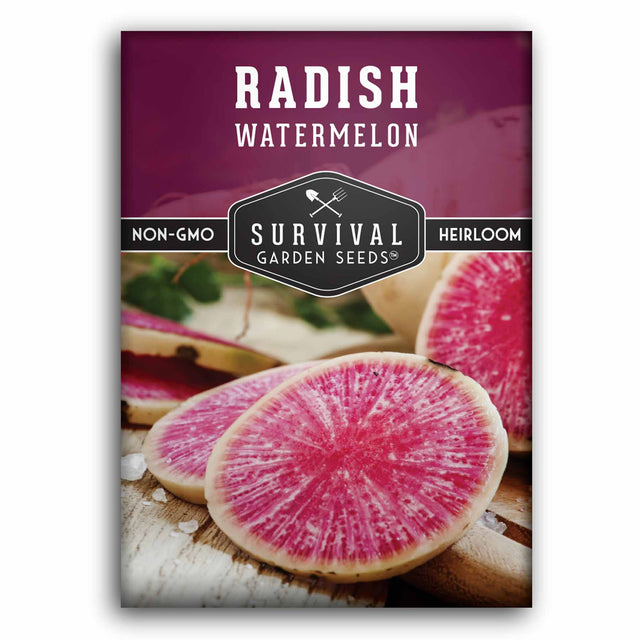Watermelon Radish Seeds – Heirloom Daikon-Type Variety with Sweet Mild Flavor & Vivid Pink Interior
Heirloom - Non-GMO - Reliable Germination
Watermelon Radish Seeds – Heirloom Daikon-Type Variety with Sweet Mild Flavor & Vivid Pink Interior - 1 Packet is backordered and will ship as soon as it is back in stock.
Brighten Your Garden with Watermelon Radish Seeds
Discover Watermelon Radish (Raphanus sativus var. longipinnatus) - also known as Shinrimei - a rare heirloom daikon-type variety celebrated for its beautiful appearance and refreshing flavor. Each round root features pale green and white skin encasing a brilliant pink-red center that looks just like a slice of watermelon. These unique radishes add color, crunch, and mild sweetness to your garden harvest and your favorite dishes.
Rare & Beautiful Heirloom Variety
Watermelon Radishes are among the most striking vegetables you can grow. Their vivid contrast of green, white, and deep pink makes them a showpiece in salads, stir-fries, and pickled assortments. With their mild, slightly sweet taste, they’re ideal for gardeners or families who prefer a less spicy radish flavor. Even kids and new gardeners find them approachable and fun to grow.
Fast-Growing Cool-Season Crop
Best sown in early spring or late summer, these cool-weather radishes mature in about 55–60 days—slightly longer than small round types but well worth the wait. The large, crisp roots are excellent keepers and hold their flavor and texture long after harvest. Plant successively every few weeks for an extended season of colorful, mild radishes.
Easy to Grow & Store
Watermelon Radish seeds germinate quickly and perform beautifully in loose, fertile soil or raised beds. Once mature, the roots can be stored in a cool, dry place for several weeks. Their versatility makes them perfect for gardeners seeking both beauty and practicality in their crops.
Why Gardeners Love Watermelon Radishes
- Striking Appearance: Green-and-white skin with vivid pink-red flesh for a true “watermelon” look.
- Mild, Sweet Flavor: A refreshing alternative to spicy radishes—great for fresh eating or pickling.
- Reliable Harvest: Matures in 55–60 days with large, crisp roots that store well.
- Culinary Versatility: Ideal for salads, stir-fries, sushi, and Asian-inspired dishes.
- Heirloom Quality: Open-pollinated variety that can be seed-saved for future plantings.
How to Grow
- Sow: Directly plant seeds ½ inch deep and 1 inch apart in rich, well-drained soil.
- Water: Keep soil evenly moist during germination and growth.
- Thin: When seedlings emerge, space plants 3–4 inches apart for larger roots.
- Harvest: Pull radishes when roots are 2–4 inches in diameter—usually 55–60 days after sowing.
- Store: Trim tops and refrigerate or cellar-store roots for lasting freshness.
Net Wt. 1.5G
Heirloom Vegetable Seeds
All of our seeds are open-pollinated, non-GMO, heirloom varieties with tested germination rates
Specifications
Specifications
-
Botanical Name
-
Planting Zones
-
Light
-
Soil Temp for Germination
-
Germination Time
-
Planting Depth
-
Plant Size
-
Days to Harvest
-
Growing Instructions
-
Seed Saving Instructions
-
Seed Count (approximate)
Payment & Security
Your payment information is processed securely. We do not store credit card details nor have access to your credit card information.
Why Choose Survival Garden Seeds
At Survival Garden Seeds, we believe in preparing today for tomorrow’s peace of mind. That’s why we offer only heirloom, non-GMO, and untreated seeds you can trust to nourish your family and support a sustainable lifestyle. As a family-owned American company, we’re committed to providing seeds that grow strong and true—helping you cultivate health, resilience, and beauty in your garden.
Frequently Asked Questions
What are heirloom seeds?
What are heirloom seeds?
Heirloom seeds are the types of seeds your grandparents grew. These varieties have been passed down from generation to generation. They’re old reliable open-pollinated varieties that aren’t typically grown commercially. Instead, they have a rich history that predates modern breeding techniques.
You can learn more about open-pollinated, heirloom, and non-GMO seeds in our Survival Garden Training blog.
How do I know my seeds are fresh?
How do I know my seeds are fresh?
Every seed packet includes a "packed for" date, and we germination test each seed lot before packaging to ensure you receive viable, high-quality seeds that are ready to grow.
Are your seeds treated?
Are your seeds treated?
No, we do not pre-treat our farmer seeds. All of our garden seeds for sale are untreated, open-pollinated, non-GMO, and heirloom varieties. They are kept in temperature-controlled cooler storage until they are packed and shipped to keep them pest and disease-free.
In what zones can I grow your seeds?
In what zones can I grow your seeds?
The seeds in our collections are specifically chosen from varieties that can be successfully grown from Zone 3 to Zone 10 USDA Hardiness Zones. However, individual varieties have specific needs to thrive in different environments. Each seed pack has optimal temperatures for germination and instructions on seed starting. Consult local frost dates to plan your garden and get the most out of your seeds.
What is the shelf life of these gardening seeds?
What is the shelf life of these gardening seeds?
Most seeds remain viable for 3 to 5 years or longer when stored properly. Check your seed packet for specific varieties. For best results, keep your seeds in a cool, dry place away from direct sunlight and moisture. Store them in an airtight container in a consistent temperature environment—a refrigerator or cool basement works well. Proper storage helps maintain germination rates and extends seed life well beyond the packed date.
Where are Survival Garden Seeds sourced?
Where are Survival Garden Seeds sourced?
The majority of our seeds are sourced in the United States, with a few exceptions when the seed is difficult to source domestically. Whenever we do have to source outside of the US, we ensure our seeds are safe to grow, non-GMO varieties that meet our standards for germination and reliability.

